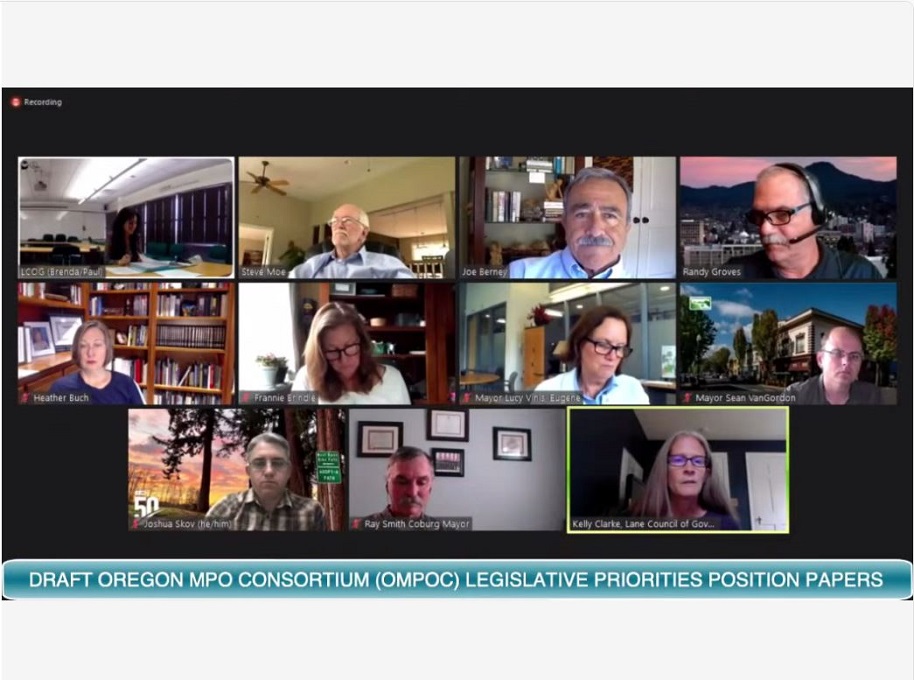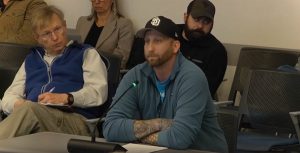Rob Zako of BEST: DeFazio transportation bill ‘a game-changer’
7 min read
At its July meeting, the MPC discussed its future role in coordinating land use and transportation.
The Metropolitan Policy Committee met July 1. Offering public comment, Rob Zako.
Rob Zako: [00:00:06] Good morning Chair (Joe) Berney, members of MPC. I’m Rob Zako, executive director of Better Eugene Springfield Transportation or BEST. I just want to share with you exciting news that perhaps you’ve already heard. BEST heard earlier today that the U.S. House of Representatives approved Congressman DeFazio’s “Invest in America Act,” which is the House proposal for a surface transportation act, which would invest in highways, transit, and rail.
These are basically the rules that guide what MPC and other MPOs (Metropolitan Planning Organizations) do and provide funding. This is something that’s done every three to five years ever since the Eisenhower era. But I would say that what DeFazio has put forward is, in the words of my colleagues, a game-changer, transformational, really a progressive bill that’s planning for America in the 21st century, not America in the 1950s.
Thank you for supporting
local citizen journalism
It has provisions for safety, for climate change, for equity, for accountability, and the people that I work with are just overjoyed with this. The one additional thing that we’re looking for is additional funding for transit operations, something we’ve seen in the pandemic that if people can’t get to where they need to go, having great buses, but not operators to drive them, doesn’t do us a lot of good.
Paul (Thompson of LCOG) may talk about this some more. This is likely the high water mark. What happens in (Washington) D.C. is that the House passes something and the Senate passes something else, and then they talk about it. And this year it’s confusing because of the jobs bill that Biden’s trying to pass. But I would just say that we see a lot in this bill and to the extent that any of you can, I would thank Congressman DeFazio. I would offer your limited support, small support. It’s doing a lot of things that collectively we want to do as a community, and we hope it passes. Thank you very much.
Mayor Lucy Vinis, Eugene: [00:01:50] I just want to reinforce what Rob has just said. I think this is a, Chairman DeFazio is a longstanding, huge champion for investment in infrastructure. This fantastic bill, it will have a huge impact on the whole national scene and it will have an impact locally and we should be grateful to him for his leadership here. And I, Rob, I hope it, I hope this goes through the Senate and hope it passes. Thank you. Thank you, Rob, for your testimony.
Lane County Commissioner Joe Berney: [00:02:21] Thank you, Mayor. This is a big deal. I think this is one of those things that Congressman DeFazio’s has been living for. And I don’t care which Congressperson, uh, this came from. I think we would owe that person a huge thank you. And I know that because it’s our own Congressman DeFazio, there are people here, including my colleague Commissioner Buch, um, who have strong relationships and we’ll make sure that we’re well positioned to both support and implement. Rob, thank you very much.
John Q: [00:02:52] Later in the meeting, Mayor Vinis returned to the topic.
Mayor Lucy Vinis, Eugene: [00:02:56] I just, I mean, we, we did just in the public comment, you know, comment on, uh, DeFazio’s Invest in America Act, we know that the Biden administration is, uh, has a bipartisan infrastructure proposal. So it just feels to me like this is an opportunity to connect the dots a little bit about what what’s happening at the federal level. And, and, um, I don’t have a kind of specific concern, but, but to make sure that we’re, this is reflects what that new legislation is offering and that we’re responsive to that.
Lane County Commissioner Joe Berney: [00:03:30] Good point. Thank you very much, mayor and yes, LTD Board Chair (Caitlin) Vargas.
Caitlin Vargas, LTD Board Chair: [00:03:38] I just want to say as a newer member of of course, appreciate everyone’s um, insights and feedback. And then also on behalf of LTD, you know, we’re just continually supporting, um, any projects that are going to, um, provide any type of robust federal investment for transit systems. So LTD is totally on board.
Josh Skov, LTD Board Vice Chair: [00:04:03] President Vargas just said, uh, obviously LTD is going to be supportive of this. I also, just two quick comments, or a comment and the question. Just overall, this is an amazing transportation agenda and looks a lot like what, uh, Rob Zako was saying about, uh, the, the package that DeFazio has put forward. So it’s pretty exciting, uh, just to see that we’re putting all this on paper. So I really think we should be supportive of this, however we can.
Um, I guess I’m curious for people who are close to the OMPAC process, I was curious about this. I was a little surprised not to see more, uh, and more explicit mention of land use and coordination with land use. I know that coordinating land use and transportation is, uh, you know, pretty front and center for the governor’s climate efforts. And I think now it’s increasingly recognized as pretty important for climate efforts overall. You can do lots of things with the transportation system, but if you’re doing it after land use has moved first, then it’s always harder. Uh, so I’m curious if there are any comments on that and if, uh, you know, just in the spirit of refining this a little bit, if there’s a place to, uh, emphasize that just a little bit more.
Paul Thompson, LCOG: [00:05:19] If I could, just to give a quick response to that. I think part of the reason you don’t see more mention of land use in this draft is because I’m going to mention two things.
First of all, within Oregon, only one of the MPOs has any land use authority and that’s Portland Metro. And while it’s important to keep in mind what you’re talking about, the link between transportation and land use, uh, it’s not the purview of seven out of the eight Oregon MPOs. And sometimes stepping into that arena at the statewide view of discussions at our box could get a little, you know, a little touchy, because Portland has a very defined role in there, the rest of the MPOs don’t.
And then second again, Oregon’s land use system and, and, uh, the involvement in it is different than most of the rest of the country. Um, so what we’re trying to do here is craft a policy paper towards the U. S. Congress that that addresses things that are, you know, going to be addressed at a congressional level, therefore, a national level.
Josh Skov, LTD Board Vice Chair: [00:06:21] Yeah. Yeah. Thank you. Uh, yeah, that, that’s super helpful, actually. That’s really, I mean, that’s, I think that’s really valuable context. The only little caveat I would give to that, just so we’re sort of preparing ourselves as a, as a group here is that, although the MPO is not the sort of, you know, jurisdictional point of intervention in land use system, we are going to have a bunch of discussions that from DLCD perspective, again, not this is not national, but at the state level, from DLCD perspective, there will be compliance obligations that are sort of weirdly shared across the jurisdictions that we all here represent across the, the cities and the county and Lane Transit District, uh, as sort of a helper for pieces of this.
So I would just sort of keep that in people’s minds. It’s, it’s not official. I mean, there is no way that it sort of requires something. I mean, as you said, uh, of the MPO itself on this, but this will be the forum, I mean: This is us. Like, this is the group where we will hash out how to, how to get towards some of those goals as a, uh, as a broader community. So I’ll just emphasize that, but that’s a, it’s a very helpful answer. Thank you.
Lane County Commissioner Joe Berney: [00:07:31] Thank you very much. It’s a helpful answer, but Mr. Skov, it’s also very helpful for you to kind of remind us of context. So thank you. Um, yes, Mayor (Ray) Smith (of Coburg).
Mayor Ray Smith, Coburg: [00:07:40] I’d like to thank Mr. Skov for bringing that up. And I want to reinforce his concern because we are currently spending an awful lot of staff time. I keep referring to staff capacity and our elected officials in the point of view that officials, one of the issues we’re having is the land use planning issue with transportation and an overlap of county ODOT and city. Uh, and, uh, even though they’re not directly related as Mr. Thompson said to the OMPOC issue, it is a big indirect issue that in, in Oregon to follow these, uh, land use planning issue while we’re trying to get our transportation system, uh, addressed with these issues that we’re putting forward. So, uh, the, I, I think it’s a good, uh, subject to keep in the back of our mind and mine, it’s the front of my mind, because we are dealing with these agencies and trying to figure out how to help, especially smaller agencies like City of Coburg, who doesn’t have a big planning staff, but needs help when we’re doing a transition between a local issue, a city that overlaps to county and ODOT.
John Q: [00:09:03] The complete meeting is available on YouTube.






